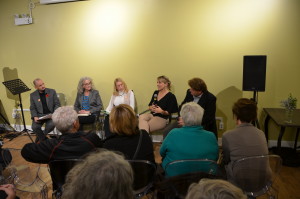Ways to humanize people in prison & reduce the stigma of loved ones
 The Turn the Page book club stimulated a great deal of discussion about the stigma. Society, in general, has a negative stigma against people that have been in prison and often their family member and children too.
The Turn the Page book club stimulated a great deal of discussion about the stigma. Society, in general, has a negative stigma against people that have been in prison and often their family member and children too.
People began to ask questions: How do we change this attitude in society and within ourselves? Given that we have a federal prison for women right here in Waterloo Region, how can we help within our own community? How can we get involved?
We’ve pulled together a range of potential ‘calls to action’ that help to humanize people in prison & reduce the stigma of loved ones. As Diane and the panelists reminded us, people in prison will leave prison when their sentences end and return to our communities. Reintegration to life on the ‘outside’ doesn’t happen by magic.
There are countless ways to be involved, likely more than we have to share, but here’s a start.
To start.. Read the Book! If you didn’t get a chance the first time around, it’s still available to borrow at KPL, WPL and Cambridge or get it for sale at Wordsworth Books in Waterloo. We developed a reading guide that might be helpful for checking some of your assumptions and thinking broadly about this issues Diane challenges us with.
If you have a book club, get them to read the book too! We’ve even created a handy Reading Guide to accompany the book.
One of the best ways to start in this area is to work directly with or support the organizations that work with inmates and their families.
- STRIDE is a program of Community Justice Initiatives. STRIDE helps women in prison build informal networks of support that assist them as they reintegrate back to the community. They also prepare the community to receive them safely and supportively. CJI has several other programs that offer support to offenders.
- John Howard Society Waterloo-Wellington offers diverse prevention, diversion, intervention and educational services for children, youth and adults who are in conflict with the law or at risk of getting there.
- Elizabeth Fry Society for Kitchener Waterloo provides gender-specific services, support and advocacy for women within the community, involved in a judicial process or who are serving sentences at Grand Valley Institution for Women, a federal prison for women located in Kitchener.
- Canadian Families and Corrections Network – another community based organization, CFCN assists families affected by criminal behavior, incarceration and community reintegration and they are currently looking for volunteers in the Kitchener Waterloo area to help support families.
- Volunteer at Grand Valley Institution – The Correctional Service of Canada has a volunteer program that works directly with recreational activities, classroom and workshop instruction, and cultural or chaplaincy activities and supports families of offenders or helping released offenders re-adjust to life.
These are all very different volunteer opportunities and if you are very interested, best to do the research and find the best fit for you and your interests. You might discover that you prefer a community based approach rather than a formal institutional setting.
Check out the ‘calls to action’ related to advocating for programs that work and creating system change.
